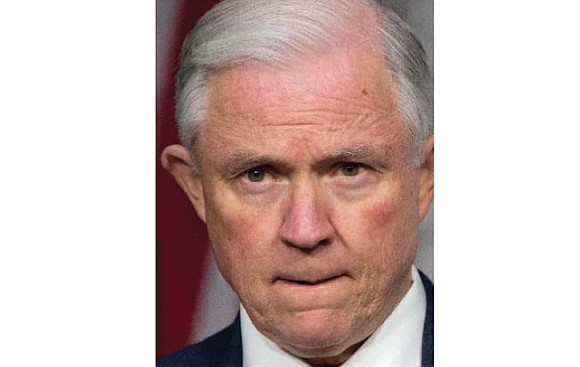Sessions seeks to revive federal anti-crime program that targeted African-Americans
Free Press staff, wire reports | 3/17/2017, 7:40 p.m.
Free Press staff, wire reports
New U.S. Attorney General Jeff Sessions vowed to revive 1990s law-and-order strategies that pumped up the nation’s prison population to the highest level in the world to fight the recent surge in urban violence.
He made the point in a tough-on-crime pep talk he delivered Wednesday to about 40 sheriffs, police chiefs and other law enforcement officials from Central Virginia during a visit to Downtown.
While more than 100 demonstrators denounced Mr. Sessions in a protest in the cold outside the SunTrust Center at 10th and Main streets, he was inside talking about ways the powerful U.S. Department of Justice he heads would work “to reduce crime and restore public safety.”
His statements underscored Mr. Sessions’ repeated promise to make fighting street crime a top mission of the Justice Department in support of state and local police.
That is a radical departure for a department that, under former President Obama, has focused more on police abuse and targeting of African-American and Latino communities, voting rights violations, prevention of cyber attacks from foreign criminals, counterterrorism and the threat of homegrown violent extremism.
Backed by President Trump, Mr. Sessions stated in prepared remarks to the Virginia officials that he would focus on preventing a return to the crime levels of two decades ago.
His top priority would be to ensure “the federal government focuses our resources and efforts on the current surge in violent crime,” he stated, citing FBI statistics that show homicides and other violent crimes have been on the upswing since 2014.
The invitation-only event organized by the DOJ and the U.S. Attorney’s Office for the Eastern District of Virginia was open to many in law enforcement, but not all.
Those snubbed included state Secretary of Public Safety Brian Moran, Virginia Attorney General Mark Herring and Richmond Commonwealth’s Attorney Michael Herring — all Democrats. None received invitations to the talk.
The Richmond Free Press also was not invited. A reporter and photographer from the state’s largest black-owned publication were turned away by security.
Joshua Stueve, director of communications for Dana Boente, U.S. attorney for the Eastern District of Virginia and acting deputy attorney general, acknowledged Wednesday after receiving a complaint from the Free Press that the newspaper was not invited.
He was responsible for sending out invitations to news outlets and said in a telephone response that the Free Press was excluded because the 25-year-old publication was not on his office’s media list.
He promised to update his media list to include the Free Press.
In his prepared remarks and in wire reports from the meeting, Mr. Sessions stated that one of his priorities would be to bring back Project Exile. That’s the 1990s program that FBI Director James Comey originated in Richmond when he was in the U.S. attorney’s office here. It allowed local authorities to turn gun crime cases over to federal prosecutors and the federal courts, where they carried mandatory five-year prison terms.
Mr. Sessions described Project Exile as “an excellent model for how we can lock up violent criminals and reduce crime.”
“During the spike in violent crime in the late ’80s and early ’90s, Richmond consistently had one of the top 10 per-capita murder rates among American cities,” he stated in his remarks.
“In response,” he stated, federal prosecutors worked with state and local law enforcement in 1997 to launch Project Exile “to take off the streets those who were mostly likely to commit gun violence: Criminals with guns.
“Over the decade that followed, murders and armed robberies in Richmond declined dramatically,” he stated. “A study published in the journal Criminology & Public Policy credited Project Exile with the reduction in gun homicides in Richmond.”
While other experts have suggested the results are far less certain, Mr. Sessions said he would “promote” Project Exile nationwide, along with similar strategies that he stated bring together all levels of law enforcement.
Despite his praise, Project Exile was seen as racially biased in targeting mostly African-American offenders. Federal judges also expressed concerns about their courts being clogged with cases that state and local officials and courts previously handled.
Acknowledging that Project Exile and similar programs led to more targeting of African-Americans, Mr. Sessions said that law enforcement has “to be so sensitive to those issues.”
He also acknowledged that “crime rates in our country remain near historic lows. Murder rates are half of what they were in 1980. The rate of violent crime has fallen by almost half from its peak.
“The people of Richmond have seen this progress firsthand,” he stated. “Since 1995, murder and violent crime rates in Richmond have fallen by two-thirds.”
But he stated that getting tough on crime is the only way to combat what he sees as an upward trend.
“The latest FBI data tell us that from 2014 to 2015, the violent crime rate in the U.S. increased by more than 3 percent — the largest one-year increase since 1991. The murder rate increased 10 percent — the largest increase since 1968.
“Since 2014, the murder rate has gone up in 27 percent of our country’s 35 largest cities,” he stated. “Here in Richmond, the preliminary murder total for 2016 was 44 percent higher than the year before, jumping from 43 to 61. And all of this is taking place amid an unprecedented epidemic of heroin and opioid abuse.”
He stated that years earlier when he was a prosecutor in Alabama, “the people in those communities pleaded with us to have more police and do a better job of getting thugs off the street.”
He said he is starting to hear those pleas again.








